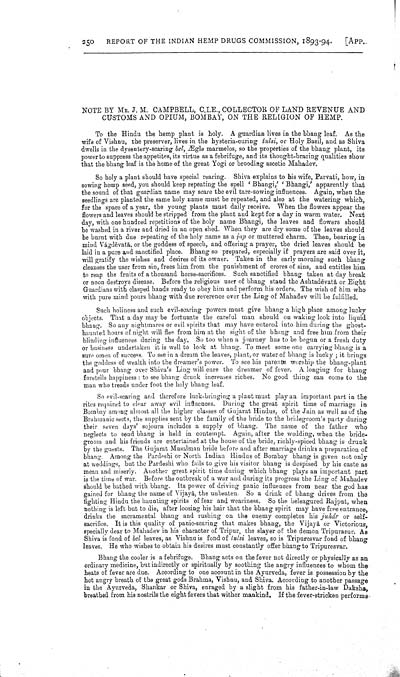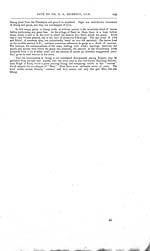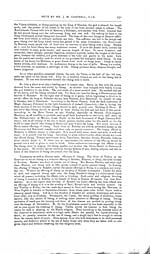Medicine - Drugs > Report of the Indian Hemp Drugs Commission, 1894-1895 > Volume III
(254) Volume 3, Page 250
Thumbnail gallery: Grid view | List view

250 REPORT OF THE INDIAN HEMP DRUGS COMMISSION, 1893-94. [APP.
NOTE BY MR. J. M.
CAMPBELL, C.I.E., COLLECTOR OF LAND REVENUE AND
CUSTOMS AND OPIUM, BOMBAY, ON THE
RELIGION OF HEMP.
To the Hindu the hemp
plant is holy. A guardian lives in the bhang leaf. As the
wife of Vishnu, the preserver, lives in the hysteria-curing
tulsi, or Holy Basil, and as Shiva
dwells in the dysentery-scaring bel, Ægle marmelos, so the
properties of the bhang plant, its
power to suppress the appetites, its virtue as a febrifuge, and its
thought-bracing qualities show
that the bhang leaf is the home of the great Yogi or brooding
ascetic Mahadev.
So holy a plant should
have special rearing. Shiva explains to his wife, Parvati, how,
in
sowing hemp seed, you should keep repeating the spell 'Bhangi,'
'Bhangi,' apparently that
the sound of that guardian name may scare the evil tare-sowing
influences. Again, when the
seedlings are planted the same holy name must be repeated, and also
at the watering which,
for the space of a year, the young plants must daily receive. When
the flowers appear the
flowers and leaves should be stripped from the plant and kept for a
day in warm water. Next
day, with one hundred repetitions of the holy name Bhangi, the
leaves and flowers should
be washed in a river and dried in an open shed. When they are dry
some of the leaves should
be burnt with due repeating
of the holy name as a jap or muttered charm. Then, bearing
in
mind Vāgdēvatā, or the goddess of speech, and offering a prayer,
the dried leaves should be
laid in a pure and sanctified place. Bhang so prepared, especially
if prayers are said over it,
will gratify the wishes and desires of its owner. Taken in the
early morning such bhang
cleanses the user from sin, frees him from the punishment of crores
of sins, and entitles him
to reap the fruits of a thousand horse-sacrifices. Such sanctified
bhang taken at day break
or noon destroys disease. Before the religious user of bhang stand
the Ashtadēvatā or Eight
Guardians with clasped hands ready to obey him and perform his
orders. The wish of him who
with pure mind pours bhang with due reverence over the Ling of
Mahadev will be fulfilled.
Such holiness and such
evil-scaring powers must give bhang a high place among lucky
objects. That a day may be fortunate the careful man should on
waking look into liquid
bhang. So any nightmares or evil spirits that may have entered into
him during the ghost-
haunted hours of night will flee from him at the sight of the bhang
and free him from their
blinding influences during the day. So too when a journey has to be
begun or a fresh duty
or business undertaken it is well to look at bhang. To meet some
one carrying bhang is a
sure omen of success. To see in a dream the leaves, plant, or water
of bhang is lucky; it brings
the goddess of wealth into the dreamer's power. To see his parents
worship the bhang-plant
and pour bhang over Shiva's Ling will cure the dreamer of fever. A
longing for bhang
foretells happiness: to see bhang drunk increases riches. No good
thing can come to the
man who treads under foot the holy bhang leaf.
So evil-scaring and
therefore luck-bringing a plant must play an important part in
the
rites required to clear away evil influences. During the great
spirit time of marriage in
Bombay among almost all the higher classes of Gujarat Hindus, of
the Jain as well as of the
Brahmanic sects, the supplies sent by the family of the bride to
the bridegroom's party during
their seven days' sojourn includes a supply of bhang. The name of
the father who
neglects to send bhang is held in contempt. Again, after the
wedding, when the bride-
groom and his friends are entertained at the house of the bride,
richly-spiced bhang is drunk
by the guests. The Gujarat Musalman bride before and after marriage
drinks a preparation of
bhang. Among the Pardeshi or North Indian Hindus of Bombay bhang is
given not only
at weddings, but the Pardeshi who fails to give his visitor bhang
is despised by his caste as
mean and miserly. Another great spirit time during which bhang
plays an important part
is the time of war. Before the outbreak of a war and during its
progress the Ling of Mahadev
should be bathed with bhang. Its power of driving panic influences
from near the god has
gained for bhang the name of Vijayā, the unbeaten. So a drink of
bhang drives from the
fighting Hindu the haunting spirits of fear and weariness. So the
beleagured Rajput, when
nothing is left but to die, after loosing his hair that the bhang
spirit may have free entrance,
drinks the sacramental bhang and rushing on the enemy completes his
juhár or self-
sacrifice. It is this quality of panic-scaring that makes bhang,
the Vijayā or Victorious,
specially dear to Mahadev in his character of Tripur, the slayer of
the demon Tripurasur. As
Shiva is fond of bel leaves, as Vishnu is fond of
tulsi leaves, so is Tripuresvar fond of bhang
leaves. He who wishes to obtain his desires must constantly offer
bhang to Tripuresvar.
Bhang the cooler is a
febrifuge. Bhang acts on the fever not directly or physically as
an
ordinary medicine, but indirectly or spiritually by soothing the
angry influences to whom the
heats of fever are due. According to one account in the Ayurveda,
fever is possession by the
hot angry breath of the great gods Brahma, Vishnu, and Shiva.
According to another passage
in the Ayurveda, Shankar or Shiva, enraged by a slight from his
father-in-law Daksha,
breathed from his nostrils the eight fevers that wither mankind. If
the fever-stricken performs
Set display mode to: Large image | Zoom image | Transcription
Images and transcriptions on this page, including medium image downloads, may be used under the Creative Commons Attribution 4.0 International Licence unless otherwise stated. ![]()
| India Papers > Medicine - Drugs > Report of the Indian Hemp Drugs Commission, 1894-1895 > Volume III > (254) Volume 3, Page 250 |
|---|
| Description | Volume 3: Appendices. Miscellaneous. |
|---|---|
| Attribution and copyright: |
|




